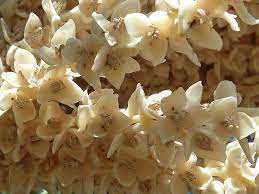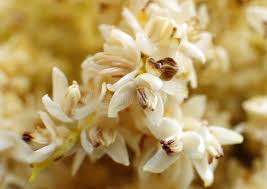Dates Stamen is a male reproductive organ found in the flower of angiosperms of a dates plant. The stamen plays a crucial role in the process of plant reproduction, specifically in the production and dispersal of pollen, which contains the male gametes (sperm cells). Each stamen typically consists of several parts, and one or more stamens are usually found within a flower alongside the female reproductive organs (the pistil or carpel).
The anther is the top, often oval-shaped, portion of the stamen. It is the site where pollen grains are produced. Inside the anther, pollen sacs called microsporangia contain pollen grains. These pollen sacs release pollen when they mature. The filament is the slender stalk-like structure that supports the anther and positions it above the other floral parts. The filament’s primary function is to ensure that the anther is positioned in a way that facilitates pollen dispersal.
Collectively, the anther and filament are referred to as the stamen. The stamens are typically found surrounding the central female reproductive organ (the pistil) within the flower. In some flowers, the stamens and pistils are positioned close together, while in others, they may be separated.
The stamens are an essential part of the process of pollination, which is crucial for the reproduction of many plant species. When pollinators such as bees, butterflies, or wind come into contact with the flower, they may inadvertently collect pollen from the anthers. This pollen can then be transferred to the stigma of another flower, leading to fertilization and the development of seeds.
The Economic Importance and Uses of Dates Stamen

Dates are a popular fruit known for their sweet taste and numerous health benefits. While the stamen of dates (the male reproductive organ of the date palm) is not typically used or recognized for its economic importance, there are some limited uses and potential benefits:
1. Pollination: Dates palm stamens play a crucial role in pollination. Date palms are dioecious, meaning there are separate male and female trees. The stamens produce pollen, which is essential for fertilizing the female flowers. Date palm farmers may collect and distribute pollen from male trees to female trees to ensure a successful fruit set.
2. Date Cultivation: Proper pollination ensures a higher yield of dates. Healthy stamens contribute to the production of viable pollen, which can lead to a more abundant harvest of dates. High-quality dates can have significant economic value for growers.
3. Research and Development: Date palm stamens can be used in scientific research and breeding programs to develop new date palm cultivars with desirable traits, such as improved yield, disease resistance, or fruit quality. This research can have economic implications for the date palm industry.
4. Traditional Medicine: In some traditional medicine practices, dates stamens have been used for various purposes, including as a remedy for certain health conditions. However, their medicinal uses are not widely recognized or supported by scientific evidence.
5. Date Production: Dates are a significant agricultural crop in many regions, particularly in the Middle East and North Africa. Date production contributes to the livelihoods of countless farmers and supports local economies. The economic value of date production includes the sale of fresh dates, processed date products, and date-related exports.
6. Date Processing: Dates can be processed into various products, such as date syrup, date paste, date sugar, and date-based snacks. These processed products have a longer shelf life and can be sold year-round, adding value to the date industry.
Read Also: Dates Calyx: Economic Importance, Uses and By-Products
7. International Trade: Date-producing countries often engage in international trade, exporting dates and date products to other nations. This trade can be a significant source of revenue and foreign exchange earnings for these countries.
8. Job Creation: Date cultivation and processing provide employment opportunities for a large number of people, including farm laborers, processing plant workers, and distribution and marketing personnel. In regions where dates are a staple crop, this can have a substantial impact on local employment.
9. Cultural and Culinary Uses: Dates are an integral part of the culinary traditions in many cultures. They are used in various dishes, desserts, and beverages, contributing to the cultural identity and culinary heritage of these regions.
10. Nutritional Value: Dates are highly nutritious and a good source of essential nutrients, including fiber, vitamins, and minerals. They offer health benefits and can be an important part of a balanced diet, potentially reducing healthcare costs and improving overall well-being.
11. Sustainable Agriculture: Date palm cultivation is often practiced in arid and semi-arid regions where water resources are limited. The ability of date palms to thrive in such conditions can promote sustainable agriculture practices, reduce environmental degradation, and contribute to food security in these areas.
The Products and By-products That Can Be Derived From Dates Stamen
Dates stamens, also known as date pollen, are a component of the male reproductive structure of date palm trees (Phoenix dactylifera). While not as commonly utilized as other parts of the date palm tree, such as dates themselves or date seeds, date stamens can still have several potential uses and by-products.
Here’s a list and explanation of the products and by-products that can be derived from date stamens:
1. Date Pollen: The primary product obtained from date stamens is date pollen. Date pollen can be collected and used in various ways, including as a natural sweetener, nutritional supplement, or as a component in traditional medicine. It is rich in vitamins, minerals, and antioxidants.
2. Pollen Powder: Date pollen can be ground into a fine powder, making it easier to incorporate into food and beverages. Date pollen powder can be added to smoothies, baked goods, and other recipes to enhance their nutritional content and flavor.
3. Pollen Extract: Pollen extract is another product that can be derived from date stamens. It is typically obtained through a solvent extraction process and may be used for its potential health benefits. Date pollen extract is sometimes used in dietary supplements and herbal remedies.
4. Cosmetics and Skincare Products: Date pollen and its extract can be used in the formulation of cosmetics and skincare products due to their potential antioxidant properties. They may help protect the skin from oxidative stress and contribute to a healthy complexion.
5. Medicinal Uses: In some traditional medicine systems, date pollen has been used for its purported health benefits. It may be consumed in various forms, such as in herbal teas, as a remedy for conditions like digestive issues, respiratory problems, and as a general tonic.
Read Also: Cassava Pistil: Economic Importance, Uses and By-Products
6. Animal Feed: Date pollen can be used as a nutritional supplement in animal feed, particularly for livestock and poultry. It can provide essential nutrients and potentially improve the quality of animal products like milk and eggs.
7. Compost and Fertilizer: Dates stamens can be composted or processed into organic fertilizer. They can contribute valuable organic matter and nutrients to soil, improving its fertility and promoting healthy plant growth.
8. Biogas Production: Dates stamens, along with other agricultural residues, can be used in biogas production. They can be added to anaerobic digesters to produce biogas, a renewable energy source, and digestate, which can be used as a nutrient-rich fertilizer.
9. Research and Development: Date stamens can be a valuable resource for scientific research and development. Researchers may study them to better understand their nutritional composition, potential health benefits, and applications in various industries.
10. Pharmaceutical Uses: Date pollen and its extracts may have potential pharmaceutical applications. Research into their bioactive compounds and therapeutic properties could lead to the development of new drugs or pharmaceutical products.
11. Natural Sweeteners: Date pollen is naturally sweet, and its powder or extract can be used as a healthier alternative to refined sugars and artificial sweeteners in food and beverage products.
12. Value-Added Food Products: Food manufacturers may incorporate date pollen or its extract into various value-added products, such as energy bars, cereal mixes, or flavored beverages, to enhance their nutritional profile and taste.
13. Beekeeping: Date palm trees produce nectar-rich flowers, and beekeepers sometimes place hives near date palm groves to produce date palm honey. While not directly a product of date stamens, this is related to the date palm’s reproductive cycle and can be considered a by-product indirectly connected to date stamens.
14. Art and Crafts: Dates stamens, when dried, can have aesthetic value and are sometimes used in arts and crafts projects, including floral arrangements and decorative pieces.
15. Waste Reduction: Utilizing date stamens and their by-products reduces waste from date palm cultivation and processing, contributing to more sustainable agricultural practices.
16. Export Potential: Dates stamens and their derived products, especially date pollen and extracts, may have export potential, contributing to the economic sustainability of date-producing regions.
In conclusion, it is essential to remember that the utilization of date stamens and their by-products can vary widely based on cultural, regional, and economic factors. Additionally, thorough research and quality control are crucial when developing and marketing products derived from date stamens, particularly those intended for human consumption or medicinal use, to ensure safety and efficacy.
Read Also: 10 Amazing Health Benefits of Cucumber Fruit

